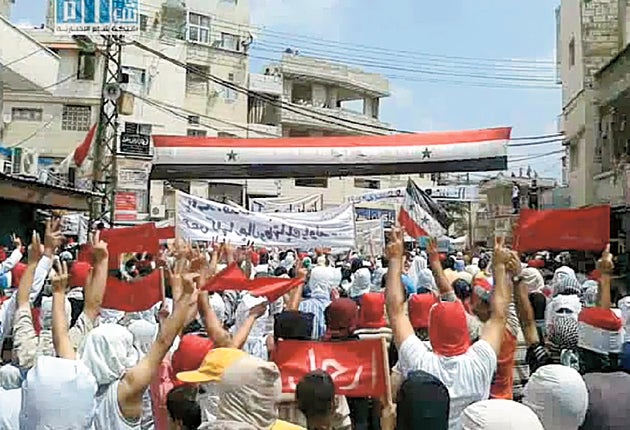Arab world turns on Assad and calls for end to wave of killings

Your support helps us to tell the story
From reproductive rights to climate change to Big Tech, The Independent is on the ground when the story is developing. Whether it's investigating the financials of Elon Musk's pro-Trump PAC or producing our latest documentary, 'The A Word', which shines a light on the American women fighting for reproductive rights, we know how important it is to parse out the facts from the messaging.
At such a critical moment in US history, we need reporters on the ground. Your donation allows us to keep sending journalists to speak to both sides of the story.
The Independent is trusted by Americans across the entire political spectrum. And unlike many other quality news outlets, we choose not to lock Americans out of our reporting and analysis with paywalls. We believe quality journalism should be available to everyone, paid for by those who can afford it.
Your support makes all the difference.The Arab world began to turn its back on Syria's president Bashar al-Assad last night after three of his Arab neighbours withdrew their ambassadors in response to the wave of killings which have blighted the Islamic holy month of Ramadan and offered stinging criticism of the regime's crackdown.
Click HERE for graphic: The tense relationship at the heart of the Arab Spring (320.87kB)
As tanks and troops continued to hammer the eastern city of Deir-el-Zour with shells and machinegun fire, President Assad found support for his Baathist regime draining away in his own backyard.
Saudi Arabia, Kuwait and Bahrain have all withdrawn their envoys since Sunday night, while in a further blow, the prime minister of Turkey, Syria's biggest trading partner, said his country's foreign minister would be arriving in Damascus today to deliver a dressing-down to the Syrian government.
The developments came after an unusually strong rebuke from King Abdullah of Saudi Arabia late on Sunday, when he demanded "an end to the killing machine" in Syria.
Top officials in the Syrian regime have been targeted by a number of European and US-sponsored sanctions since the uprising began in mid-March, but until yesterday there had been little in the way of condemnation from any of the Arab states.
Yesterday's dramatic show of disapproval means Mr Assad, who has tried to avoid the fate of his deposed counterparts in Egypt and Tunisia by the application of brute force, now finds himself backed into a diplomatic corner.
Radwan Ziadeh, a human rights activist and one of Syria's most prominent political exiles, said: "The symbolic steps from King Abdullah, Bahrain and Kuwait are very important. There is no excuse for the United Nations Security Council to take no action now."
Last week the Security Council issued a statement condemning Syria, but drew back from rubber-stamping a resolution – the harshest measure available to members.
In an attempt to alleviate the pressure yesterday, Damascus said it would remove the its defence minister, but as support for Mr Assad haemorrhaged last night, shells from his army's tanks were still crashing down on cities up and down the country.
On the banks of the Euphrates river in the east, one eyewitness in Deir al-Zour told The Independent by phone that the city had become a ghost town as tanks laid siege to residential areas. "There are no people on the streets and the snipers on the high buildings are killing anybody they see," said the man, who asked not to be named. The reports cannot be verified because journalists are banned from Syria.
Videos uploaded onto YouTube showed black smoke rising above the city as machinegun fire rattled in the distance.
Another, apparently shot in a makeshift morgue, showed an elderly man with blackened skin and two holes in his head where the skull had been blown away. It was not possible to verify either of the films.
There was violence elsewhere across the country too. According to Wissam Tarif, executive director of the Insan human rights group, the Syrian army is now fighting on more fronts than at any time since the uprising began in mid-March.
Analysts say that Mr Assad wants to use the fasting month of Ramadan to crush the anti-government movement, as many activists had hoped to rally support over the next few weeks.
Mr Tarif said: "One medical source in Hama told me that over the last few days he knows of 100 fatalities, but nobody has a total death toll covering the whole city."
He said doctors in Hama, which faced a ferocious army crackdown at the beginning of Ramadan, suspected the security services of carrying out execution-style killings, with many bodies being brought in with point-blank bullet wounds.
The Condemnation
"Any sane Arab, Muslim or anyone else knows that this has nothing to do with religion, or ethics or morals; spilling the blood of the innocent for any reasons or pretext leads to no path to...hope.
Syria should think wisely before it's too late and issue and enact reforms that are not merely promises but actual reforms.
Either it chooses wisdom on its own or it will be pulled down into the depths of turmoil and loss."
King Abdullah, Saudi Arabia
"When the number of innocent people killed exceeds 2,000, it is something totally unacceptable."
Sheikh Mohammed al-Salem al-Sabah, Kuwaiti Foreign Minister
And the response
The statements from Saudi Arabia and the Arab League ignore the "extremist and terrorist groups that have sought to tear up Syria's unity". Front page of Syria's pro-government Al-Watan newspaper
Join our commenting forum
Join thought-provoking conversations, follow other Independent readers and see their replies
Comments